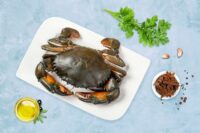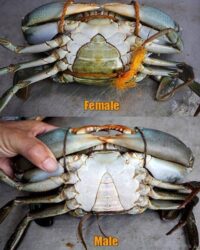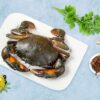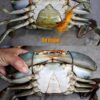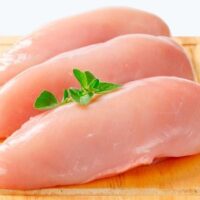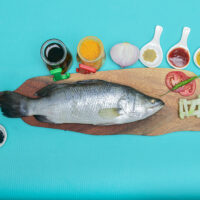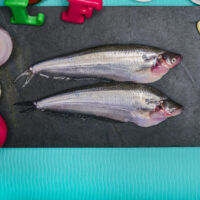Description
Crab meats are known for its flavourful meaty taste. These exotic crabs are juicy and delicious in taste. The succulent tasty meat makes it favourite among many. It is a famous seafood item among many Indian households. One can cook numerous dishes with these delicious crabs. This is a great source of protein and omega-3 fatty acid. It aids brain developments and protects the heart from various diseases. In 1 Kg there will 4 to 6 pcs of Crabs
These seawater crabs are cut in the following way. Shell will be detached and then joint softly for easy removal for use. claws and legs will be separated, The quantity is perfect for 2-3 people.
Crab is a popular seafood known for its sweet and delicate flavor. The nutritional composition of crab can vary slightly depending on the specific type of crab and the cooking method. Here is a general overview of the nutritional value of cooked blue crab (per 100 grams):
– Calories: Approximately 87 calories
– Protein: Approximately 18 grams
– Fat: Approximately 1.3 grams
– Saturated fat: Approximately 0.2 grams
– Monounsaturated fat: Approximately 0.2 grams
– Polyunsaturated fat: Approximately 0.5 grams
– Cholesterol: Approximately 85 milligrams
– Sodium: Approximately 324 milligrams
– Potassium: Approximately 324 milligrams
– Omega-3 fatty acids: Approximately 0.2 grams
– Omega-6 fatty acids: Approximately 0.3 grams
– Vitamin B12: Approximately 11.5 micrograms
– Niacin: Approximately 2.3 milligrams
– Selenium: Approximately 42.5 micrograms
– Zinc: Approximately 2.1 milligrams
– Copper: Approximately 0.3 milligrams
– Phosphorus: Approximately 250 milligrams
Crab is low in calories and fat but high in protein, making it a nutritious seafood choice. It is a good source of essential vitamins and minerals, including vitamin B12, niacin, selenium, zinc, copper, and phosphorus. These nutrients play various roles in maintaining the body’s overall health, such as supporting nerve function, aiding in energy production, and promoting immune system function.
It’s important to note that the nutritional composition can vary depending on the specific type of crab, as different species may have slightly different nutrient profiles. Additionally, the values mentioned here are approximate and can vary depending on factors such as the cooking method and preparation techniques used for the crab.
